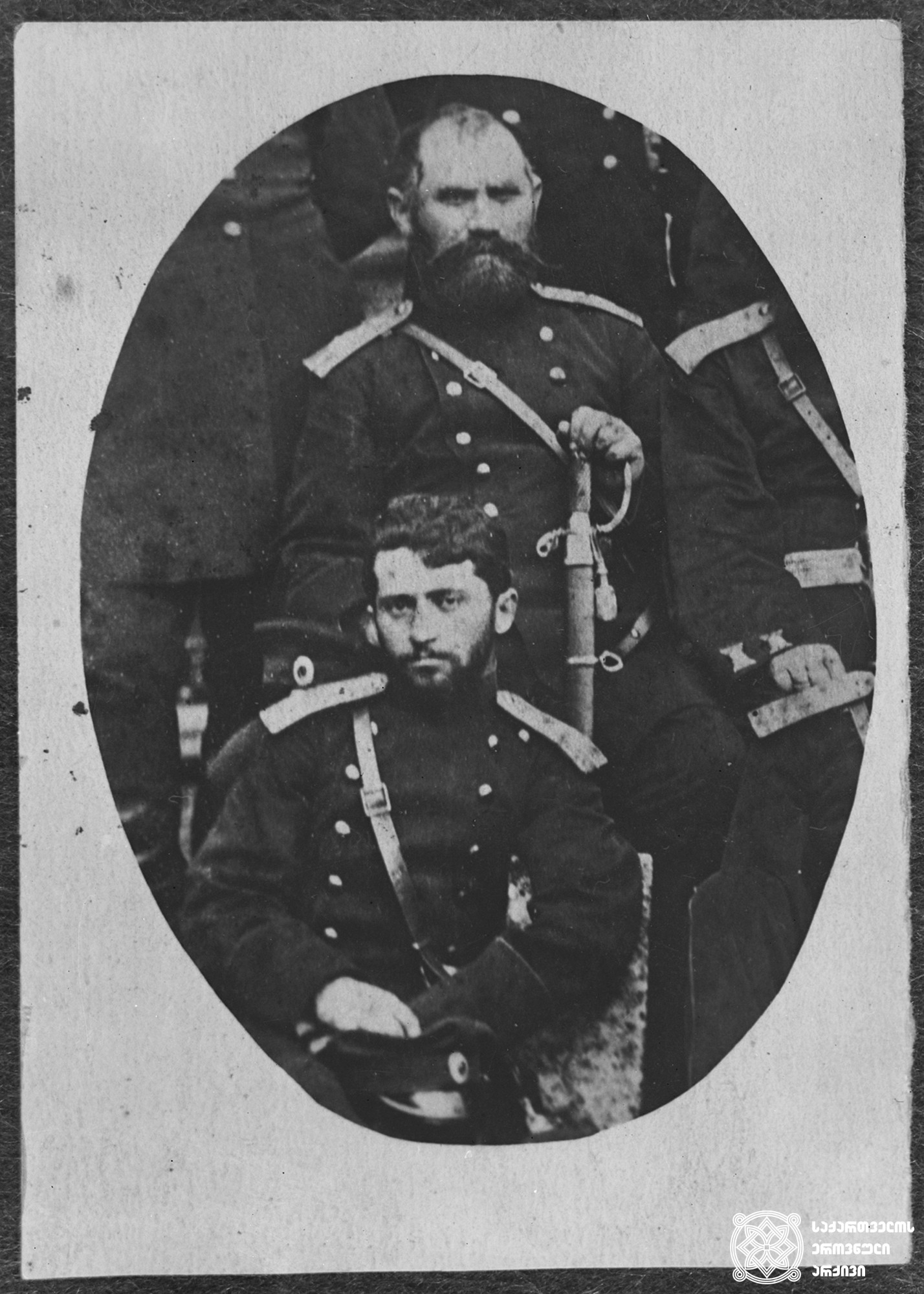

Davit Kldiashvili was born on September 11, 1862 (August 29 in the old style) in the village of Simoneti in the family of Samson Kldiashvili and Kesaria Ghoghoberidze. He spent his childhood in Simoneti and Deduleti, in the village of Khomuli, in the family of his grandfather, noble Niko Ghoghoberidze.
Davit was taught to read and write by his mother, then he was sent to the Mrelov Preparatory School in Kutaisi. In 1872, at the age of 9, his parents sent him to study at the Kiev military academy.
"I didn't see my parents for three years, after three years I got money in the spring and after the exams I went home for the holidays. I had already forgotten Georgian. I stayed in Kutaisi for two weeks, and since my mother didn't know Russian, I didn't know Georgian, so I took my cousin who was the same age as me as a translator and went to the village with my mother... With tears of joy, I met my mother, who had been very ill from sadness during these three years... This summer, I remembered the language and When I returned to the gymnasium, I took little books with me. After that, every year I returned home for summer vacations and gradually I became better able to speak Georgian and I didn't get bored like some of my comrades..." - wrote Davit Kldiashvili in his memoirs "Chemi Tsckhovrebis Gzaded".
After completing his studies at the Kiev Military Gymnasium, he studied at the Moscow Military Academy in 1880-82. From September 1882, he returned to his homeland and started working in the Batumi military unit, as the head of the gun-weapon repair workshop.
.jpg)
"They took me to the Juruli family and introduced me . Ketevan got me involved in the work after some time. A performance was held for the benefit of the school; Giorgi Eristavi's "Gakra" was being staged, I was assigned the role of Gabriel... Ketevani would sit me in chair and let me play the role. I had to repeat my monologue ten, fifteen times; I was bored with such studies, but no less bored was my teacher, who sometimes called me impatiently: "You can't do that, boy, you have to learn Georgian, you are Georgian!" I was also very eager to learn my language, but I was slow to succeed."
"Chemi Tskhovrebis gzazed"

.jpg)
Davit Kldiashvili's first literary work, a short story translated from German, was published in "Nobati" magazine in 1883.
From 1893, he started printing his own works. This year, readers saw "Mskhverpli" and "Sheriskhva". In 1894 "Soloman Morbeladze" was published, and in 1897 - "Samanishvili's Dedinatsvali". Davit Kldiashvili's pen belongs to "Darispanis Gasachiri", "Ubedureba", "Bakulas Ghorebi", "Irenes Bedniereba", "Mikela" and others.
Davit Kldiashvili's works became the basis for many films and plays. In 1929, during the writer's lifetime, director Kote Marjanishvili filmed "Samanishvilis Dedinatsvali" (the 1977 feature film based on the same work belongs to director Eldar Shengelaia).
David Rondel's "Dakarguli Samotkhe", which was released in 1937, was filmed based on the motifs of Kldiashvili's stories.
The audience saw the feature film "Bakulas Ghorebi" directed by Bidzina Rachvelishvili in 1976.
The National Archive of Georgia also keeps audiobooks of Davit Kldiashvili's works:
Soloman Morbeladze - Davit Kldiashvili. Reading: Eros Manjgaladze, 1968
Rostom Manvelidze - Davit Kldiashvili. Reading: Tamaz Kvatchantiradze, 2014.
After the revolution of 1905, Davit Kldiashvili, as an unpopular lieutenant colonel, was forced to resign from military service.
From 1905, he worked first in the Kutaisi city administration, and then in the black stone industry division of Chiaturi.
In 1914, he was called to the Ottoman front by mobilization and was appointed commandant in Lazistan.
In February 1918, he was engaged in military service in Batumi, on the Adjara river. On March 31 of this year, he took the last train from Adjara.
From September 1, 1919, he served in the armed forces of the First Republic of Georgia - in the headquarters of the first division. After the reorganization of the troops, from 1920, they were transferred to the reserve.
Davit Kldiashvili enjoyed great love and respect from Georgian writers and public figures.
Galaktion Tabidze:
"When I pick up Davit Kldiashvili's book, I can't help but think: here is Kldiashvili, an inimitably eloquent writer with a peculiar color (don't forget: the first Georgian public writer). You can't help but remember Paolo Iashvili's lines: "And this world turned into the end of an Arab fairy tale." If it were not for Davit Kldiashvili, Solomon Morbeladze would have remained untouched in world literature, no writer would have been able to imagine, portray Bekina, and Darispan along the entire Black Sea coast, who travels with his unwavering purpose. He travels with his lapchini, khurjini and "Ime-Ime". If not for Davit Kldiashvili, Karozhna would have remained untouched, the most beautiful Karozhna."
Galaction Diary. December 27, 1954.
.png)
"The freedom of the Georgian nation makes me happy because it is given the opportunity to develop the beautiful spirit that is embedded in it, and I believe that with this, the Georgian nation will join the longed-for brotherhood of the rest of humanity.
Glory to the great soul of the Georgian nation!
July 21, 1918.
St. Kutaisi
Dav. Kldiashvili"
Note: A photocopy of the autograph is preserved in the National Archives of Georgia.
In 1920, the government of the First Republic of Georgia celebrated the 30th anniversary of Davit Kldiashvili's writing career.
After the sovietization of Georgia, the writer returned to his native village. There, the elderly Davit Klidiashvili wrote several more stories. In 1924-1926, Kldiashvili's new stories "Shua Ceckhlis Piras" and "Kimote Meshvelidze" were published. In 1925, the memoirs "Chemi Tskhovrebis Gzaze" were published.
In the summer of 1930, Klidiashvili was honored with the 40th anniversary of his writing activity and was awarded the title of People's Writer of the Republic.
The writer died in his native village Simoneti on April 24, 1931. He was buried in the pantheon of writers and public figures.